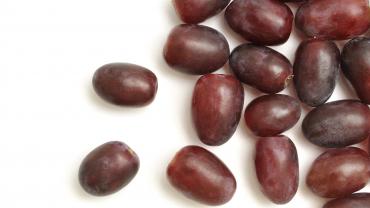
The health-supportive role of grapes continues to be a robust topic of research. Grapes contain many bioactive and health-supportive molecules, which include dietary fiber, polyphenols (such as pro-anthocyanidins), and flavonoids (such as quercetin). Research indicates that fruits containing high levels of polyphenols may exhibit prebiotic activity and support the composition of the gastrointestinal (GI) microbiome.
A recently published pilot study by Yang and colleagues explored the impact of supplementation with grape powder on the GI microbiome. Healthy participants between the ages of 18 and 55 years who habitually consumed a diet low in dietary fiber and polyphenols were recruited. The study included a 4-week standardization phase consisting of a low fiber and low polyphenol diet followed by the treatment period. The treatment period involved 46 g or the equivalent of two servings of standardized freeze-dried whole table grape powder daily for 4 weeks while continuing the low fiber and low polyphenol diet.
Data from 19 participants were collected for the 8-week study period. Changes in fecal abundance of certain microbiota were observed. Significant increases in organisms in the genera, Akkermansia, Flavonifractor, Lachnospiraceae, and the phylum Verrucomicrobia were reported after treatment as compared to baseline. Significant decreases in Bifidobacterium and Balister were also observed.
Akkermansia is a genus of microorganisms that has been shown in recent research to influence lipid metabolism. It also has been shown to help modulate mucin production and support the protection of the GI barrier, which may help prevent dysbiosis. The authors of this study also noted that the reason for the decrease in Bifidobacterium is largely unknown.
Other changes observed in this study by Yang and colleagues include biomarkers related to lipid metabolism. At the end of the 4-week treatment period, a 6.1% decrease in total serum cholesterol level and a 7.6% decrease in high-density lipoprotein cholesterol level was reported. Also observed were significant decreases in serum conjugated primary bile acids (BAs) and decreases in conjugated secondary BAs.
Polyphenol-rich foods, such as grapes, have been studied for decades for their supportive role in cardiovascular health. Dietary intake of flavonoids, a subclass of polyphenols, has been associated with a decreased risk of cardiovascular disease. Polyphenols have been shown to modulate low-density lipoprotein oxidation and influence the development of atherosclerosis.
Research studies continue to elucidate the health-supportive role of polyphenol-rich fruits, such as grapes. Grapes have been shown to support cardiovascular health in many ways. According to the study by Yang and colleagues, the researchers suggest that grapes may also support a healthy GI microbiome composition.
By Colleen Ambrose, ND, MAT